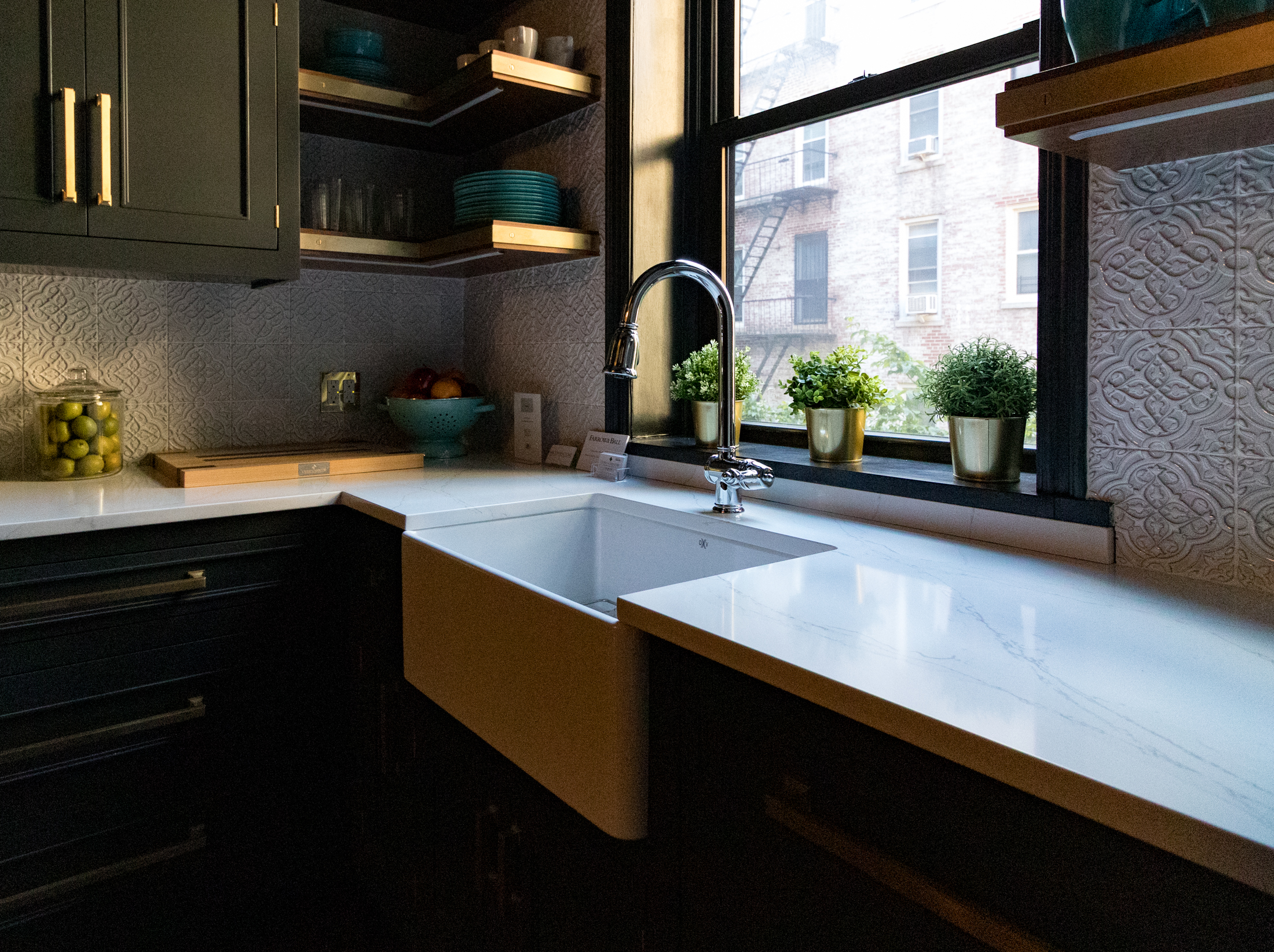From the Forum: Contractor 101
About to begin bidding process. Words of wisdom? We are working with an architect on a big renovation project of a landmarked house. (It is not a gut.) We are about to start the bidding process. I realize that the quote is only part of the decision factors. What questions would you ask of the…

About to begin bidding process. Words of wisdom?
We are working with an architect on a big renovation project of a landmarked house. (It is not a gut.)
We are about to start the bidding process. I realize that the quote is only part of the decision factors. What questions would you ask of the bidding contractors?
Any other advice from btdt.. what would you have done differently? what did you like?
Our big worry is time, as we will have to move out during the renovation.
Click through to the post to see some answers and help out.
Have answers? Need help with something? Visit the Brownstoner Forum.









1)Old time common sense never hurts. Ask for references and ask those references about a) the contractor meeting time frames. b)Contractor adding on a lot of new charges once he is on the project c)ask them if things broke or leaked etc after a few months and if they did-did he come back for free?
2)IT always helps to put in a bonus if he finishes on time and a penalty if he finishes late. We are all human and every contractor will prioritize a job in which there is some extra meat.
3)review the contract with a developer or seasoned construction guy to know if EVERYTHING is in there.
4)Hire an attorney to review contractors insurance to make sure you dont get sued if his subs get hurt on the property etc.
One thing to make sure of is whether he’ll be using his own crew or sub-contracting the work out. When we picked our GC who was also our architect, he said he had his own crew and we’d viewed a few places that they’d done and it looked quality. But shortly before work started, he said he was going to use a sub-contractor for alot of the major work. I remember thinking at the time that this probably isn’t good but he assured us they’d be fine.
Two weeks into the job and the Albanian sub-contractor’ guys tear down about 2 feet of my neighbours back wall stretching 2 floors. That then led to a 3 month stop work order. And then the Albanian sub’s out work to another crew for other stuff.
When we were about 6 months behind schedule, my GC suggested we pay his sub’s directly and ahead of schedule cause they’d get the job done sooner. And when you’d re desperate, you do it. Big mistake. So instead of owing our GC a $30k lump sum at the end, we only owed him $1000.
Long story short, he ended getting screwed by his subs and having to pay his crew to finish the job. He’s since closed down his company, which then left us having to pay his guys to wrap up a few grand worth of punchlist items.
I feel your pain but as someone thats been there and seen it many times, your issue is not about having subcontractors. That is actually a plus. 99 percent of successful gc’s sub out and compartmentalize every part of construction into many categories and subs. They then hire an expert for every field of work. The gc’s that do all themselves are jacks of all and masters of none. You want a painting specialist to do the paint. A brownstone specialist to do the exterior. A hardwood specialist to do the hardwood etc
Your issue I would say is about the GC taking idiotic subs! IT would be wise to ask you for permission to vet the subs. I do that!
OK. As someone just about to finish up an 11 month renovation of a landmarked wood frame house, I feel like I want to take you out to lunch and tell you all of our mistakes on this exact topic. In lieu of that, I’ll try to be brief. Here’s a few of pearls of wisdom I’ve gleaned from doing it wrong (in no particular order):
1. Call the contractor’s references. Ask detailed, prying questions. Find out what they loved. Find out what drove them nuts. Find out if the contractor was able to track design changes without making mistakes, whether they retained instruction, how many mistakes they made and how the fixed them. Find out how close to the schedule the contractor was able to come in. Every job runs over, but what were the causes, if any? Did they fix errors before being told to or did they wait to see if the owner or architect would notice? How organized was the work site? How were they at cleaning? I could go on and on but hopefully you get the idea.
2. Think hard about this question: Do you feel comfortable and secure handing over your life savings (or what could be someone’s life savings) to this person? Because that’s what you’re doing. Do you trust them that much? Do you have enough information to be able to answer that question? If not, get more.
3. Don’t settle. If you meet with ten contractors and haven’t fallen in love, keep looking. You are about to get married. You need to feel like you can hang for the long haul. This is war. Does your contractor have your back? Are you ready to get into the trenches with them?
4. Ask to see schedules the contractor has prepared for other jobs – in their entirety. Ask to see accounting, final books and receipts from other jobs. Are they organized and neat? Did they hand over materials receipts to the owner at the end of the job? Comes in very handy when you need to track down that rare tile again for a fix in ten years. If they can’t produce these, move on.
5. Try to seek out and find subcontractors the contractor has worked with. Did they feel the contractor was organized and could run a job efficiently and in sequence? How long have they been working with the contractor? How many jobs have they done together? If it was one and done, why was that? Subcontractors can give you an amazing amount of information about contractors – they work with so many.
6. Did the contractor turn the bid around in an organized, timely fashion? Did he ask good detail questions? Is he curious? Ask him how he would solve any particular challenges you know about your upcoming job. Does he or she seem like they have some wisdom and that they’re good at problem solving?
7. Once you do hire a contractor, you will hit bumps in the road. But knowing what I know now, if you hit three major issues – in my case, not ordering cabinets early enough in the process, causing severe delays; building walls in the wrong places and getting way behind schedule – or if you’re simply becoming intensely frustrated at, say, a lack of organization or the inability to follow instructions, specs or drawings – FIRE THEM. It will not get better. There is the temptation to think this will cost you time and money – and it will – but it will save you months of working with someone you increasingly hate and that you also have to keep writing the biggest checks you will ever write in your life to. And then, like me, you will understand how people walk into work and kill everyone on that fateful day when they’ve finally had enough. (That was a joke – kind of – not a real threat. Really. I think.)
8. Which reminds me – everyone will tell you it’s overkill but get a great construction attorney who can write you a real contract so that you’re covered when your contractor goes six months over the scheduled completion time because he had to build everything twice. Once without looking at the plans and once again to fix it. Seriously. Get. A. Good. Attorney. And. Get. An. Ironclad. Contract. Use it. Track the job. Make sure you use real change orders. There will be a temptation to let things slide – everybody likes to be liked. Do not succumb to this temptation. Do it by the book, keep it organized.
9. Which brings me to – don’t be a bad client. Do your homework, make your choices, be decisive and get all your finishes and appliances, etc. on-site way before your contractor or subs need them. You have to be good, too.
10. Bring coffee and doughnuts once in a while and say thanks. Especially if your contractor rocks it. And then send me their number so I know who to call next time. Be paranoid, be on it and don’t be afraid to ask questions.
Good luck.
That is a great list. I have had 5 projects in my apartment over the last 15 years – all with good resluts. I am fortunate to have the same contractor for most of this work. What I am best at is point #9. I am way ahead of the contractor on most of the material spend. For a gut kitchen with minor plumbing and electrical, i had arranged cabinets, tile, stone counter, stairs, and all fixtures. Always had coffee. The supply chain was ahead of the contractor. I had personal contact with the contractors every day (there are always decisions to be made). Job took 5 weeks. If you don’t have a familiar contractor then Steps 1-4 are essential.
I am on the board of my coop and most projects fall behind through owner mismanagement
Already ordered. Thanks!
Thanks. Yes, I need that drink. And then about 1000 more. I re-posted this (and edited it a bit) over in the forum thread. I think the comments are a little more coherent over there. #learning #ptsd #pappyvanwinkletotherescue